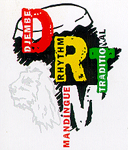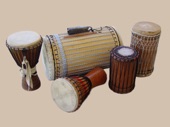AZ Drum And Dance
West African Drum Class



Join us to learn and play the indigenous music of the Djembe
Tuesdays: Beginners (Level I)
7:30pm - 9:00pm
Thursday: Beginners (Level I)
11:00am - 12:30pm
Fridays: Advanced (Level II / III)
7:30pm - 9:00pm
(See definition of Levels below)
$10 per class
Call Lorin for registration and further information: 480 251 5351
We will work on traditional Malinke rhythms.
Students will learn all parts on Dununs and Djembes.
If you have no drum let us know, we have extras. Although we recommend that you get your own Djembe once you are committed to keep learning
(... and practicing :-).
A sound example of the Advanced Level Class:
The rhythm Soko (click on the picture)
The Music of the Malinke
The djembe and the music played with it has its origin with the Malinke people (or Maninka) people of the Mandeng Empire located in West Africa. Today this is mainly Mali, Guinea and Ivory Coast. Drumming was never intended to be an art form. It was and is an integral part of the way of life. Their music is complex, not familiar to Westerners, but the polyrhythms and the swing used in this music is the foundation of todays Jazz and Latin music. The map shows in red the regions where the Djembe is played.

The Djembe drum has become increasingly popular outside of Africa and worldwide since the 70s. More people are becoming familiar with it through performance or have participated in instructional jam sessions.
However, there is more to the music of the Djembe.
AZDrumAndDance provides the opportunity to learn how to play the complex rhythms and experience it's cultural origins.
The classes are taught by Bernd Geh with the assistance of selected AZD&D members.
What is your level ????
Below you will find the AZDrumAndDance definition of the different levels. This will help you understand in which level you belong and the teaching objectives of each class. If you want to learn Malinke music you will realize, that your learning process will go through different phases which we try to account for in the different levels.

Bernd Geh has been continuously teaching West African drumming since 2001 in the Phoenix area. Bernd is originally from Germany. His major and most influential teacher is Herman Kathan, who is a professional musician and certified Mamady Keita instructor. Bernd took part in Mamady Keita’s professional level education program. Bernd also learned from numerous African masters and teachers, such as Famodou Konate, Adama Drame, Amadou Kienou, Moussa Traore, Abdoul Doumbia and Bolokada Conde. Bernd is a physicist by education, his passion for West African music provides a healthy balance with his professional life and is a wonderful complement to science: African music combines aspects of science and metaphysics. The structure of this music has an unintended -but yet brilliant - logic with analogies to geometry or the complex but perfectly regular structure of crystals.
However, drumming - and especially drumming for dancers - can put you in a mind state that is beyond the scope of physics. Both aspects are major driving forces for him to continue the never-ending path of being a learner combined with the joy of teaching this wonderful music.
Bernd and his wife Lorin are the founders of AZDrumAndDance.
If you have any questions, please call Lorin at 480-251-5351 or send email to Lorin@AzDrumAndDance.org.
Level I
The learning phase of a level I drummer can be described as the "pattern acquisition and motor skill phase". You spend most of your energy in learning the drum patterns and working on your motor skills. Level I drummers usually don't understand and hear the other parts of the rhythm while playing their own parts. In order to learn a djembe or dunun part you will need hours and very often the pattern will be gone once you stop playing for a while or have played another part. While you are a level I drummer, you are also beginning to learn a clear differentiation between the different sounds on the Djembe (slap, tone, bass)
The level 1 class focuses on rhythms with what would be called a 4/4 metric. Among the Malinke rhythms those are the least difficult to learn. In a teaching block each student will learn all the djembe accompaniments and all the dunun accompaniments. At the end of a session, the class will be able to play all parts of the rhythm as an ensemble.
Level II
A level 2 drummer already knows the basic accompaniments of 4/4 and 6/8 rhythms. Slaps and tones are no major obstacles anymore. The motor skills of playing bell and sticks on a dunun are developed. The learning phase of a level II drummer can be described as the "play and listen phase". You will slowly start to hear the other accompaniment parts of the rhythm, while you play your own part. You will start to understand your accompaniment in the context of the entire rhythm.
The level II class focuses on more complex rhythms including dunun variations and solo phrases. We will also learn echauffements. In level II class, we will also start to explore the "microtiming" of this music - slight syncopations which make this music sound so interesting and spicy.
A year or more of level I instruction (or the approval of the instructor) is required for level II class.
Level III
A level III drummer has typically been learning for 3-4 years on a continual basis. You are a level III drummer, when you don't need more than 5 minutes to learn and play any new pattern. In this phase you are not collecting patterns anymore, you focus on the music. As a level III player, you will be able to play difficult off-beat figures and won't be "sucked" onto the beat anymore. You can clearly hear all the other accompaniments and don't get confused by them. The phase of learning can be described as the "groove and energy phase".
The level III class focuses on the groove of the music. We will use the microtiming to make the rhythms sound energetic. We will also work on speed and will understand how the swing of this music changes with speed. Echauffements, breaks and solo phrases will be a considerable part of the learning.

Classes resumed, but due to the ongoing COVID-19 situation,
class is only open for students who are fully vaccinated.
Wearing of face mask is required during class.





